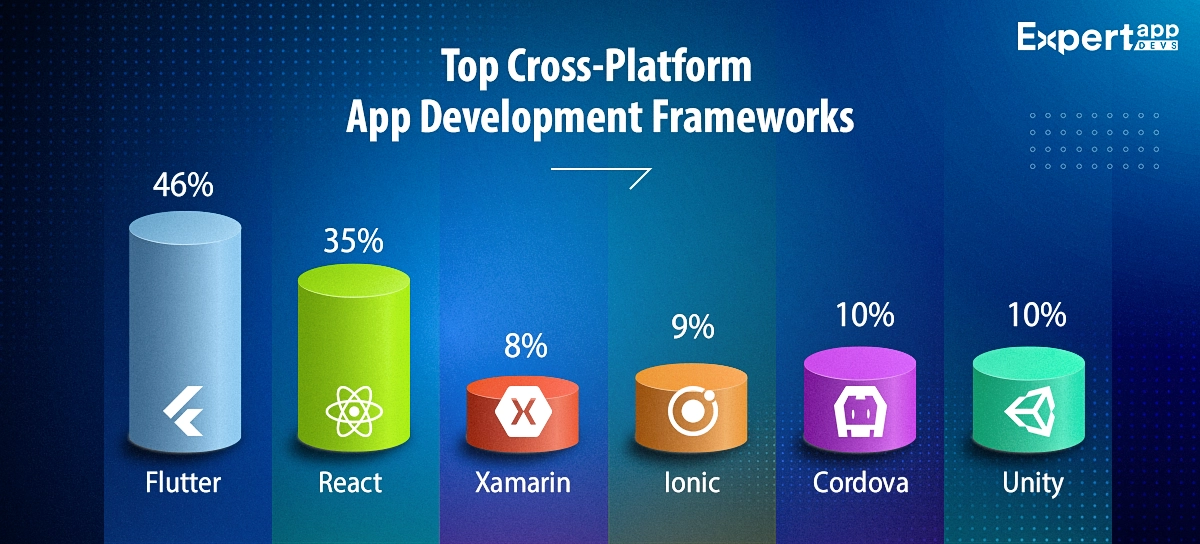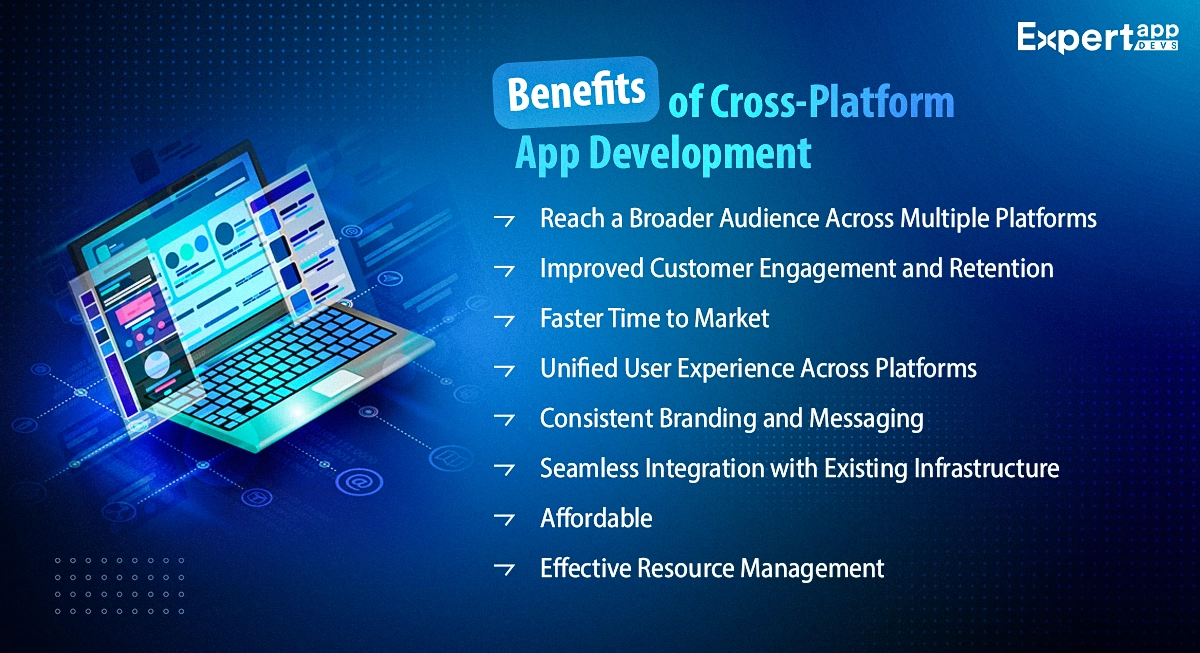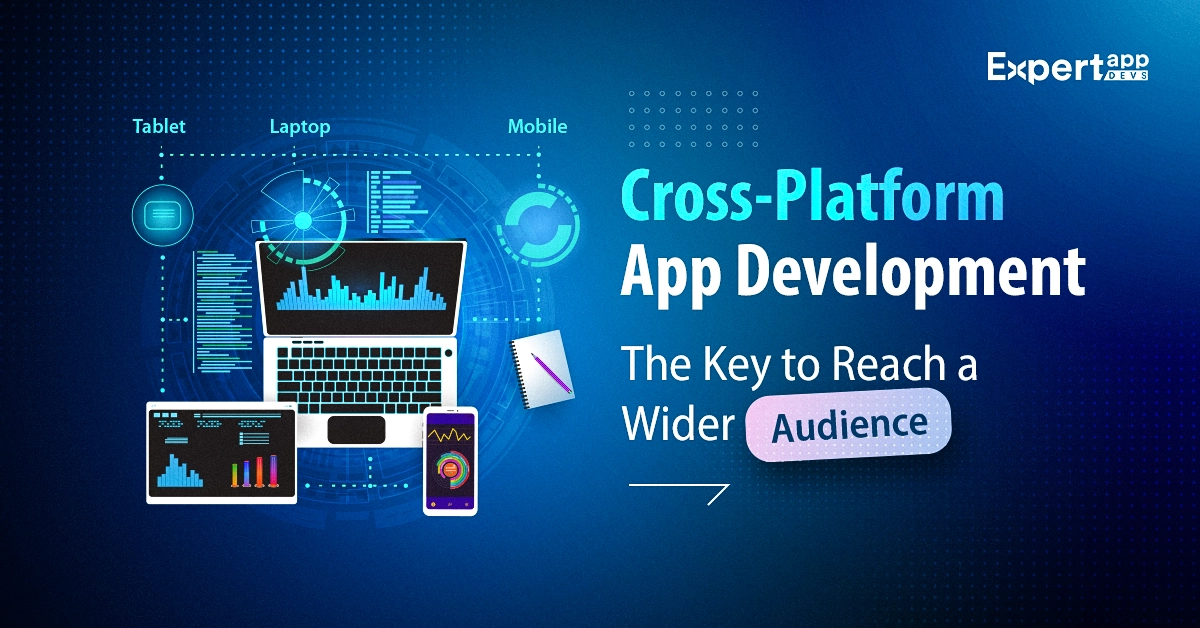How Can Cross-Platform Apps Reach Wider Audiences with Efficiency?
Did you know that over one-third of mobile developers use cross-platform frameworks? Nowadays every business wants to launch their app at the earliest to secure the top position in the market. Today's generation spends most of their time on mobile hence there is a huge rise in mobile usage. This has led to a rise in cross-platform app development. Global News Wire research predicted that the cross-platform market will cross US$ 546.7 billion by 2033. With rapid speed development and advanced features, cross-platform apps have the full potential to reach a wider audience base with stunning mobile apps.
In this article, we will discuss the benefits, best practices, and many important aspects of cross-platform app development to know how it helps to reach a broader audience.
Why Reach a Wider Audience?
Reaching a wider audience is the ultimate goal of all businesses because it allows them to sell their products and services to more people. It boosts your brand recognition and makes your business visible to potential customers who are seeking a particular service or product.
When your business reaches to wide audience through different channels, there are better chances of turning visitors into loyal customers.
Additionally, this helps businesses to achieve new milestones and capture market share in this competitive market.
Industry Statistics on User Engagement through Cross-Platform Apps
Let's explore some industry statistics related to cross-platform apps and how they drive user engagement.
- 70% of users prefer apps that work seamlessly across devices. (Source: Adobe)
- 90% of B2B buyers are likely to make repeat purchases from mobile apps that have a great experience.
- 83% of users prefer consistent experiences across platforms.
- The market share of global cross-platform app development is expected to grow by 15% each year till 2026.
Key Frameworks for Efficient Cross-Platform App Development
The frameworks might vary from business to business depending on their business goals and target audience. Below are the key frameworks for efficient cross-platform app development.

#1. Flutter
Flutter is a versatile framework by Google that helps developers create responsive apps from a single codebase. It comes with an impressive array of pre-designed widgets and tools to create visually attractive and high-performance apps for both iOS and Android platforms. You can use Flutter to monetize your apps using Google Ads.
Overall, its hot reload makes it suitable for cross-platform apps by speeding up development.
#2. React Native
React Native is one of the popular cross-platform frameworks that Facebook backs. It helps developers to build mobile apps using JavaScript and React with the use of native components. React native has a strong community and numerous libraries hence it is an ideal choice for making a quick and high-quality app.
#3. Xamarin
Xamarin was founded by the American company Microsoft, it uses C# to build cross-platform apps. Developers can directly access the native APIs to add a native-like look and feel to their app.
The strong integration of Xamarin with Visual Studio, Microsoft Office services, and Azure active directories makes it perfect for developers who already know the Microsoft ecosystem and want to use a single programming language for multiple platforms like iOS or Android.
#4. Ionic
If you are fond of reading financial news, you might have heard of MarketWatch. MarketWatch made their app using the Ionic framework to have a native-like experience and offer greater flexibility to users.
Ionic is an open-source framework that comes with pre-built components and tools. Developers can develop hybrid apps using HTML, CSS, and JavaScript. It also offers lots of customization options to add side menus, sliders, lists, and various appealing graphics.
#5. Cordova
The famous app Wikipedia is also developed using Cordova and is available for IOS and Android. Apache Cordova provides access to native features hence you can easily create mobile apps using HTML, CSS, and JavaScript, wrapping them in a native container. It is the best option for someone looking to integrate cameras, GPS, and other mobile native features in their app.
#6. Unity
You might have played Super Mario Run. This mobile game is developed using the Unity engine and offers amazing 2D and 3D graphics.
Unity is a powerful cross-platform framework primarily used for developing cross-platform games. It has a robust toolset and graphics capabilities which makes it an easy choice for game developers.
Benefits of Cross-Platform App Development
Cross-platform is the new generation development because it caters to multiple platform needs in this fast-paced world.

#1. Reach a Broader Audience Across Multiple Platforms
You can target multiple platforms(iOS, Android, Web, Desktop) by writing code for just one app and using it for all platforms. This means you can reach a broader audience base with less effort and coding.
#2. Improved Customer Engagement and Retention
With a single codebase, you can develop multiple apps for different platforms and make them easily accessible to use. This helps in better engagement by delivering consistent functionality and experience across various devices no matter what device they use.
#3. Faster Time to Market
Less coding time means faster time to market. A single codebase is one of the biggest advantages of cross-platform apps. This allows you to launch your app on multiple platforms for iOS and Android at the same time and stay ahead of other competitors.
#4. Unified User Experience Across Platforms
As the same code is used for all apps, the inner properties and functionalities are almost the same hence it helps to deliver a consistent experience across different devices. In simple words, your app will look and function similarly whether it’s used on iOS, Android, or other platforms, giving a smoother and more predictable user experience.
#5. Consistent Branding and Messaging
The same look and feel will make the audience more familiar with your brand and color hence it will easily get recognized by a wider audience due to its brand identity, no matter whether they are using an app on iPhone or Android.
#6. Seamless Integration with Existing Infrastructure
Adjustments are easy in cross-platform apps as you only need to make changes in a single codebase. It can be easily integrated with your existing systems, such as databases or APIs. hence with minor changes, you can make your app run smoothly with your current infrastructure without spending on extra resources.
#7. Affordable
You are writing code only once using the same resource, tools, and framework for all platforms. Hence there are no additional things required separate for each platform. This helps you save development time and cost and maintenance costs too.
#8. Effective Resource Management
You can manage your team and budget in a smart way as overall app development will require fewer resources.
Success Stories: Businesses That Succeeded with Cross-Platform Apps
A lot of businesses have succeeded in this competitive edge, only because of cross-platform apps. Let's explore some of the real-life examples using cross-platform apps to reach a wider audience.
#1. Airbnb
Airbnb is the leading accommodation platform which is developed using React Native to create a seamless experience for users across both iOS and Android.
#2. SoundCloud
Through cross-platform development, the sound cloud has been able to work on both IOS and Android by not having to maintain two different code bases. This helped in the quick introduction of features and updates leading to an improved experience for users and the growth of the site as one among other platforms offering music streaming services.
#3. Instagram
Instagram has started using React Native in specific parts of its app, which has enabled it to provide a uniform experience across iOS and Android platforms. Through using a cross-platform development scheme, it was easy for Instagram to quickly change its app by adding new features that all users could access at once – this contributed greatly to its increased usage and fame.
#4. Uber
We all use Uber for quick taxi booking. It has been used by most of the Indian users and is successfully running. The cross-platform approach allowed Uber to provide consistent functionality to drivers worldwide, which helped the business to scale rapidly by offering reliable services for its users.
#5. Alibaba
Alibaba is a global e-commerce platform that uses react native to deliver a unified shopping experience to worldwide regions.
There are a number of cross-platform apps that we use in our daily lives and that are developed using different frameworks and successfully thriving.
Best Practices for Cross-Platform App Development
Understand this, best practices lead to better development. You must follow standard coding practices and make a proper plan before jumping into cross-platform app development.
#1. Define Clear Objectives
Having a clear goal is the first thing before making any app. You must know your business goals and expectations you are looking to fulfill through the app. You must understand how the app will benefit users, and how it will contribute to your business growth. Begin with studying market trends and analyzing your competitors, this will help you narrow down your goals and fill the missing gaps in the app.
#2. Select a Suitable Framework Based on Your Needs
Explore various frameworks that fit into your development needs. For example: If you are developing the app from scratch and want to reach a wider audience for iOS and Android, go for Flutter. If you are making changes to an existing app and looking to use native-like features, choose native.
#3. Design for Multiple Platforms
Always use components and features in such a way that it gives a consistent design appearance on multiple platforms.
#4. Code Reusability
Reuse the code as much as you can. You can use the same code for the same logic and features. This reduces development time and effort. In the future, you can also easily maintain and update the code due to its familiarity.
#5. Use Platform-Specific APIs
If your app includes any specific features or new integrations, then always use platform-specific APIs to ensure high performance.
#6. Conduct Rigorous Testing on Various Devices and Platforms
The real job lies in testing. Make sure your app is free from all bugs and errors before launching. Use reputed testing methods and tools and test apps on multiple platforms. Check every feature and functionality to ensure a 100% user experience and avoid glitches.
#7. Keep it Simple
Simplicity is always best because it makes the app easy to use and understand the features. Hence, avoid unnecessary features and complexity. Only add important features that are needed.
#8. Collaborate with Experts
Work with experienced cross-platform app developers who have done plenty of app development projects earlier and are familiar with cross-platform frameworks.
#9. Stay Up-to-Date
Technologies are upgraded from time to time. You must keep your app updated with the latest technologies and trends. Otherwise, it can impact the app's performance, resulting in bugs or failed functionality.
Next Development Trends in Cross-Platform App Creation
App development and technologies are constantly evolving things, below are the next development trends in cross-platform app creation. Let's dive in.
#1. Machine Learning and Artificial Intelligence
To boost usefulness, cross-platform applications are being integrated into machine learning and AI. These technologies help apps to offer more personalized services such as recommendation and predictive analysis. Additionally, they can also be used for task automation, improving user interaction through more intelligent and efficient apps across diverse platforms.
#2. Internet of Things (IoT)
The Internet of Things (IoT) connects devices and sensors, enabling apps to interact with smart devices and collect data. Cross-platform applications will be taking more advantage of IoT for real-time information and control of different connected devices, thus giving users a better integrated and easier way of life.
#3. Progressive Web Apps (PWAs)
Progressive Web Apps (PWAs) help to combine the most effective features of web and mobile applications to offer a fast, reliable, and engaging user experience. PWAs work offline and send out push notifications. If you focus more on targeting reach then PWAs are the best option.
#4. Bitcoin
Bitcoin is not a new name in the growing world of virtual currency and is gradually finding a place in app development. Recently, developers have been using it in their applications mostly for payment purposes and to offer a variety of financial services.
#5. Connecting Clouds
Connecting clouds is the new trend of connecting cloud services using cross-platform apps. This helps to effortlessly connect with diverse cloud systems and provides superior storage methods, data alignment, and extensibility.
How Expert App Devs Can Help You With Top-Notch Cross-Platform Development?
At Expert App Devs, we have a proven track record of providing cross-platform app development services. Our professionals have extensive experience in catering to complex app requirements. Our app developers implement the best practices and are proficient in frameworks like React Native or Flutter to deliver you a well-crafted and efficient app.
Let’s get in touch if you want to hire cross-platform app developers at affordable prices! You can hire 3 plus experienced developers at USD 2500 along with a project manager. If you would like more flexibility, we offer hourly rates beginning from just USD 22. Don't believe us? Get started with our free trial and get the best developers onboarded within 2 working days.
Conclusion
Cross-platforms are worth it for every business as it comes with lots of advantages. Maintaining both quality and performance becomes easier as businesses use one codebase for many platforms thus reducing the time spent on development as well as the costs incurred in the process. Overall it also offers better market coverage and enhanced satisfaction among users.
Hope you find the above article helpful to understand how cross-platform app development is beneficial and a worthy choice for the fast-evolving market.
FAQs
#1. How Much Does Cross-Platform App Development Cost?
✅The cross-platform app development price depends on various factors like app complexity, features, technologies and tools used, developer experience, developer rates, and many more. On average, simple apps cost around $15,000 to $25,000, while more complex apps with advanced features can range from $60,000 to $200,000 or more. Also, prices may fluctuate from country to country and additional expenses may include post-launch support and updates.
#2. Can Cross-Platform Apps Handle the Specific Needs of Different Platforms?
✅Yes, cross-platform apps are developed in such a way that they will cater to the particular requirements of various platforms. Developers can write a single codebase using modern frameworks like Flutter, React Native, and Xamarin to meet the different needs of individual platforms such as iOS, Android, and the web. This framework supports native APIs and tools hence the cross-platform app performs well and looks consistent across platforms.
#3. What Tools Are Commonly Used For Cross-Platform App Development?
✅There are plenty of tools available for cross-platform development. Some of the popularly use tools are Flutter, React Native, Xamarin, and Ionic. Above all tools are developed by reputed industries like Google, and Microsoft, hence they are the top choice of the leading IT industries for cross-platform app development.
#4. Can I Hire Cross-Platform App Developers On A Freelance Basis?
✅Yes, hiring a freelancer is a good option if you need cross-platform app developers for the short term. You can easily find skilled freelancers for cross-platform developers on popular platforms like Upwork, Fiverr, Toptal, and more.
✅Pro tip: check portfolio, expertise, type of cross-platform projects they have worked on, and reviews before hiring any freelancer.
#5. What Are Cross-Platform Apps, And How Do They Reach Wider Audiences?
✅Cross-platform apps are apps that are built on a single codebase to run on multiple platforms like iOS, Android, or the web. Due to its single code base, businesses can develop apps for multiple platforms and reach a wider audience. Furthermore, this also saves time, resources, and money.
#6. How Do I Ensure The Quality Of Cross-Platform App Development?
✅The very first thing is to hire a proficient cross-platform app developer and choose the right framework from Flutter or React native. This will ensure the app is made professionally and with fewer errors. To ensure the quality of the app, there are several things to keep in mind :
- Keep the app simple and easy to use.
- Use best practices for coding, design, and user experience.
- Test your app against all target platforms to check for bugs or performance issues.
- Keep the app updated regularly based on user feedback.
 Jignen Pandya
Jignen Pandya




